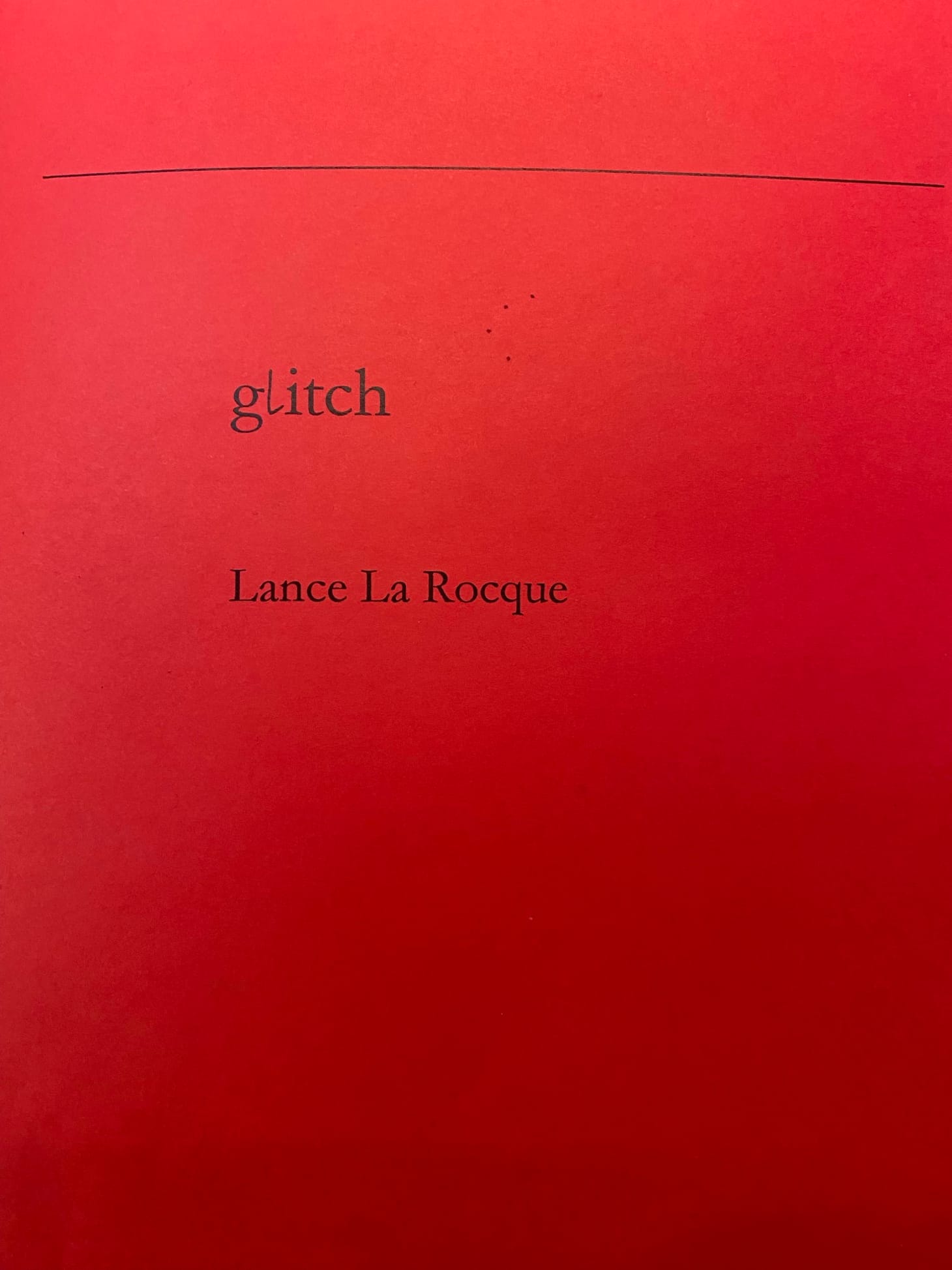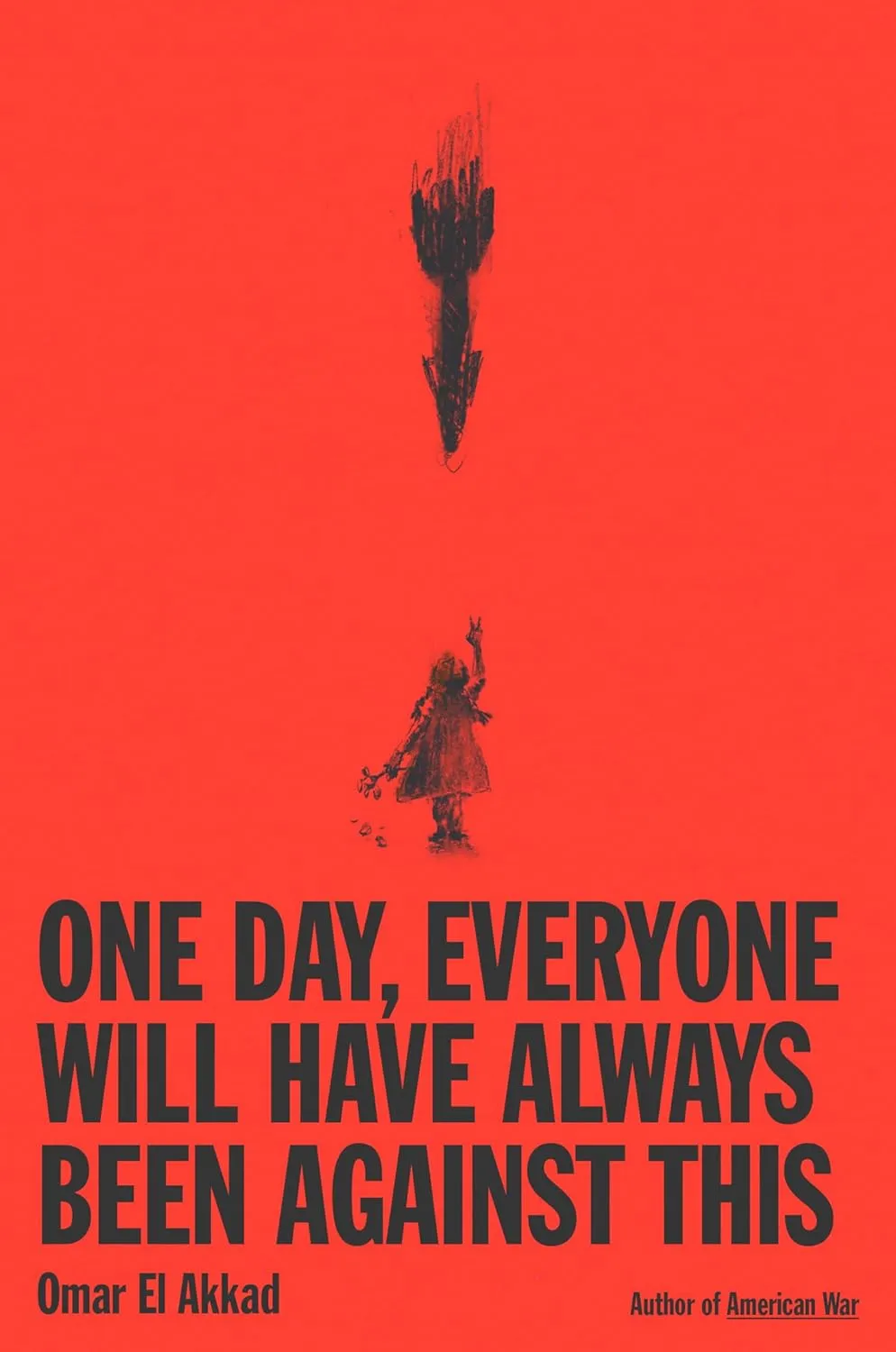Lance La Rocque, Glitch
Lance La Rocque, I believe, contains such perspicaciousness and self-awareness. I trust his poetry.

It is election night in Canada in what many may consider the most monumental federal electoral happening of their lives, I know I certainly do. Nothing, besides a Xanax dressed as Big Bird from Sesame Street or a steam bath of chloroform could knock me out.
So I am finally picking up a 2020 chapbook by none other than Lance La Rocque to soothe my nerves. I have been saving this work for a special occasion, for not only is it published by rob mclennan’s above/ground press, La Rocque acknowledges two favourites of mine, Stuart Ross and Alice Burdick, in the back of the chap for “generous editorial advice.”
Lance La Rocque is a beloved and celebrated professor of literature and writing at Acadia University in Wolfville, Nova Scotia, has poems in Ross’s Surreal Estate: 13 Canadian poets under the influence, and other creative and academic work reaching back as long ago as 2002 (the last palindrome year of the Gregorian calendar we will witness until 2112).
From Surreal Estate:
HISTORY IS THE EXCEPTION
This present
is this
present.
The other ones
are sleeping,
their eyes red with
dreaming.
Or not.
The others: imaginary skeletons
deprived of bodies,
writhing under
the linoleum. The asphalt.
The earth.
Or not.
I awaken to this.
Most things are
never born.
But some things are/
born dead.
And ghostlike,
they make their ways
among the furniture,
wandering on the brink
of resignation and despair.
As a millennial, I am of the stubborn inexplicable opinion that some of you reading this might share that in the year 2025, you could still very much base an entire writerly career on the concept of despair and make a life out of it. I think only a handful of Spanish-language writers and a handful of Canadian poets understand this, although it probably has roots in something like Lautréamont.
Regardless of whether you write poetry, non-fiction, or blogs, the theme of despair is such a Mariana Trench of irony and narrative force, like the deep sea itself, I would consider the majority of it unexplored. That, even by mere mention of it, no less in the final line of a surrealist poem, I take it as a sign of perspicacity and awareness unobtainable by a vast swath of living writing authors around the world today. It’s just one of those things to me.
Lance La Rocque, I believe, contains such perspicaciousness and self-awareness. I trust his poetry.
And I say millennial even though the roots extend into the past well before my time because it is exceedingly rare as time goes on, but has been sparse looking back. Sure, you may find themes of despair in works by someone such as Victor Hugo or Bloy (author of the novel Le Désespéré, one of the few titles mentioned by Borges in his inimitable column Biblioteca personal)—it is perhaps best depicted by Alfred de Musset in his 1835 poem Le Pélican [English follows original]:
Quel que soit le souci que ta jeunesse endure,
Laisse-la s’élargir, cette sainte blessure
Que les séraphins noirs t’ont faite au fond du coeur ;
Rien ne nous rend si grands qu’une grande douleur
Mais, pour en être atteint, ne crois pas, ô poète,
Que ta voix ici-bas doive rester muette.
Les plus désespérés sont les chants les plus beaux,
Et j’en sais d’immortels qui sont de purs sanglots.
Lorsque le pélican, lassé d’un long voyage,
Dans les brouillards du soir retourne à ses roseaux,
Ses petits affamés courent sur le rivage
En le voyant au loin s’abattre sur les eaux.
Déjà, croyant saisir et partager leur proie,
Ils courent à leur père avec des cris de joie
En secouant leurs becs sur leurs goitres hideux.
Lui, gagnant à pas lent une roche élevée,
De son aile pendante abritant sa couvée,
Pêcheur mélancolique, il regarde les cieux.
Le sang coule à longs flots de sa poitrine ouverte ;
En vain il a des mers fouillé la profondeur ;
L’océan était vide et la plage déserte ;
Pour toute nourriture il apporte son cœur.
Sombre et silencieux, étendu sur la pierre,
Partageant à ses fils ses entrailles de père,
Dans son amour sublime il berce sa douleur ;
Et, regardant couler sa sanglante mamelle,
Sur son festin de mort il s’affaisse et chancelle,
Ivre de volupté, de tendresse et d’horreur.
Mais parfois, au milieu du divin sacrifice,
Fatigué de mourir dans un trop long supplice,
Il craint que ses enfants ne le laissent vivant ;
Alors il se soulève, ouvre son aile au vent,
Et, se frappant le cœur avec un cri sauvage,
Il pousse dans la nuit un si funèbre adieu,
Que les oiseaux des mers désertent le rivage,
Et que le voyageur attardé sur la plage,
Sentant passer la mort se recommande à Dieu.
Poète, c’est ainsi que font les grands poètes.
Ils laissent s’égayer ceux qui vivent un temps ;
Mais les festins humains qu’ils servent à leurs fêtes
Ressemblent la plupart à ceux des pélicans.
Quand ils parlent ainsi d’espérances trompées,
De tristesse et d’oubli, d’amour et de malheur,
Ce n’est pas un concert à dilater le cœur ;
Leurs déclamations sont comme des épées :
Elles tracent dans l’air un cercle éblouissant ;
Mais il y pend toujours quelque goutte de sang.
Whatever may be the concern your youth endure,
Let prosper this holy wound
That black seraphims left in the bottom of your heart—
Nothing makes us so grand as a grand pain;
But, to be afflicted by it, don’t believe, dear poet,
That your voice henceforth must remain silent.
Most desperate are songs most beautiful,
And I know of timeless ones forged of pure sobs.
Such as when the pelican, from long journey spent,
Returns to his reeds under the immesurable fog of night,
His famished nestlings run along the shore,
Seeing him from afar alight upon the waters.
Yet, thinking to seize and share their prey,
With shrieks of joy they run to their father
Shaking their beaks upon their hideous glands.
And he, ascending a tall rock with measured pace,
Ushering in his flock with pendulent wing,
Melancholic fisherman that he is, looks to the skies.
Blood pours out in long streams from his open chest—
He foraged the sea deep in vain:
The ocean was empty, the beach was barren—
For all sustenance he gave his heart.
Sombre and silent, laid out on the stone,
Sharing his paternal innards to his offspring,
He cradles his pain in a sublime act of love.
Upon seeing his bleeding breast,
He falters and submits to the feast of his death,
With tenderness and horror, drunk on pure will.
Yet betimes, amidst his divine sacrifice,
Weary of dying from too long a feast,
He fears his children won’t leave him alive;
So he rises, opening his wing to the wind,
And, beating his heart with a wild shriek,
Cries out a farewell into the night so deathly
That the birds of sea abandon the shore
And the straggling beachcomber in his surprise
Prepares to meet his maker with a little sign.
Poet, it is thus that the greats perform their craft.
They let those who live a while make merry and well;
But the human feasts they serve at their fêtes
Mostly resemble those of pelicans.
When they speak thus of false hopes,
Of sadness and oblivion, of love and malice,
It makes not a concert to delight the heart;
Their harried words stick like swords
And draw a stunning circle in the air,
But therein always lingers some drop of blood.
[Editor’s note: translation my own —J.M.]
It is with this that I leave you, time no longer permitting me to linger with La Rocque, with a poem of his that encapsulates this:
Child
Dark night. Nothing but dreams. That means I have slept, sifting the
rusty coils.
and staring through slits on the upper deck where I’ve lost my dime
again. Again.
I’d rather have been encased in the silent black rock, and you scrape
away all the marks
on the shell. All that I’ve done and not done.
The silver lining is the long needle. Repeated punctures. Lungs. Ear
drums. The soft valves
in sounds it sounds like love is the punishing machine.
I am begging you god guide my child through the passages and
creatures
of this crowded circus. Until he’s done. I can’t.
I awaken paralyzed, blind from the hammering
injustice or indifference builds on a face.
Bibelotages Newsletter
Join the newsletter to receive the latest updates in your inbox.



